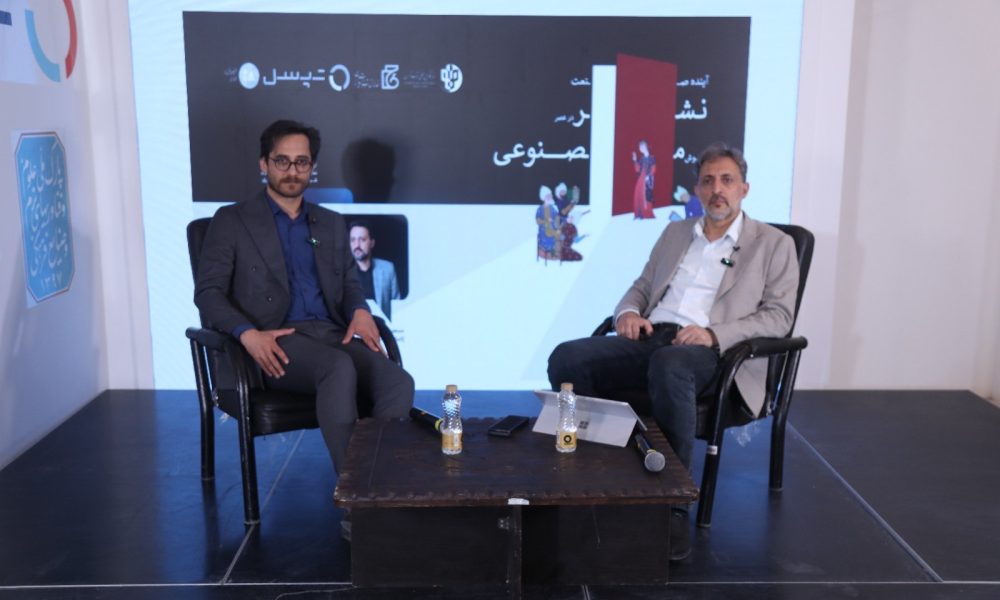A series of meetings on the publishing industry in the age of AI, featuring Masoud Saeedi, a business and brand development strategist, on Advertising strategies in the publishing field, was held in the Publishing Technologies Hall at the 36th Tehran International Book Fair.
According to Ideaagency, Masoud Saeedi, Business Development and Brand Strategist in a conversation with Sadegh Attarzadeh, explained about advertising strategies in the publishing space: “Advertising tactics and strategies are different for publishers. We have four basic items that publishers need to pay attention to when it comes to what becomes a brand for advertising: publisher, author, topic, and storytelling.”
He explained about the four parts of the publishing brand: “In literature, we have the author’s brand, usually the publisher is not that important. But in the scientific and cultural fields, the publisher has priority. For example, in the marketing and publishing fields, we have a specialist brand where the author slowly builds a personality by focusing on a topic. The subject brand also becomes prominent in times when there is a social wave.”
Emphasizing the importance of creative marketing in publishing, he said: “The cultural market, especially the publishing market, should move towards creative advertising. Its model is different for social and cultural reasons, and advertising should be able to achieve the most with the least cost. Creative marketing helps sell products in the new era. Guerrilla marketing can be used. For example, events held by publishers around the world help with marketing. Since books are one of the few products that are produced once, they can be sold many times and have great advertising potential.”
Regarding the problems of the publishing sector, Masoud Saeedi said: “The problem is that we have considered support for books as a cultural commodity from the past. The publisher is expected to depend on this sector to survive. Nowhere in the world do you see governments supporting the publishing sector.”
The technology activist explained the obstacles in the publishing industry: “In the past ten years, contrary to popular belief, we have been facing a trend of growth in the financial volume and the amount of publishing and books printed. The important question is what should make the price of goods cheaper? Like everywhere in the world, competition determines the price and also promotes progress. While the support of the government and institutions has had adverse effects. The European Union does not simply consider music and film as cultural goods and does not have a protective approach. The government should only be responsible and a legacy of past products so that they do not disappear.”
Referring to the current state of the publishing industry, Saeedi admitted: “In a situation where we are facing a $195,000 publishing market per year, if only 10 percent is spent on advertising, like other markets, it would be very meaningful. So we are facing a solid and solid business. In principle, why should there be support and subsidies? The only support that the legislator can consider should be to open up breathing space.”
He added: “If we examine the source of income of writers in the past few decades, how many percent of them were not through writing, and the connection between literature, cinema, and television was not established. After the revolution, some writers began to work with a marketing perspective.”
Saeedi added: “In our publishing and art, for example, after making half of a series, they get feedback and make a sequel. In the market, publishers monitor the current waves and decide whether to invest in a book or not. There is a big problem in this area, and this process of the publisher receiving subsidies and charging the author for publishing the work is a vicious cycle.”
Saeedi explained the publishing industry’s view of cultural products: “In the publishing industry, there is no long-term view of the product and no branding takes place. When a behavior is repeated in the market, personality is formed, and successful publishers in Iran work in this way.”
He concluded: “Like all other markets, perhaps a period must pass before an industry can progress. Market behavior in the world has changed in all businesses, infrastructure industries in the world have changed so much that they have had to make fundamental changes. Markets in the world are uncertain. Managers need transparency, but they can’t make decisions in conditions of uncertainty, and it’s not clear what changes AI will bring to the market. Publishers are in the same situation.”
Regarding the war between brands that began in the 21st century, Saeedi said: “The war between brands is the most beautiful and healthy war in human history, which has no human or cultural casualties, and humans can satisfy their aggressive nature. I fully defend it because it creates jobs, passion for life, and competition. The ultimate winner is the consumer, and it is a battle of powers.”




No Comment! Be the first one.